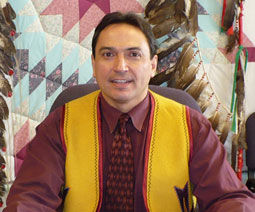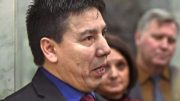(November 2019) – Chiefs of the Tall Cree First Nation, Little Red River Cree Nation, Beaver First Nation, and Dene Tha First Nation met recently to discuss a proposed land framework in Peace Country. A letter dated November 12, 2019 was sent from County Reeve Josh Knelson to Alberta Minister of Environment and Parks Jason Nixon proposing a number of land use objectives. Among the several proposed objectives is the sale of 350,000 acres of land.
The Chiefs, representing their Nations, reject this proposal, and remind the Provincial Government that any activities that may impact First Nations are subject to their right to be meaningfully consulted and accommodated as well as to free, prior and informed consent.
Chief Conroy Sewepagaham, Chief of Little Red River Cree Nation and Grand Chief of the North Peace Tribal Council, states:
“I remind Premier Kenney, and all Albertans, that as Dene, Beaver, and Cree peoples, we have occupied our Territories since time immemorial, and continue to do so today. We did not cede title to the lands when we entered Treaty No. 8 but agreed to share our Territory in peace and friendship. Alberta should understand this by now, and realize it has no authority to take up and sell our land in our Territories without our free, prior informed consent.”
“We are spiritual peoples; our churches, our cathedrals, our places of worship are braided in these forests that surround us.
“If I was to start tearing down each and every church in the Mackenzie County, it would be considered heresy, and this blasphemous action wouldn’t sit well with the religious groups.”
Dating back to 2010, a Provincial 3 phase land transfer plan has sold off more than 120,000 acres of lands within the northern Peace Country without the consent of the First Nations in the area. In spite of continued opposition from First Nations, Alberta Premier Jason Kenney has expressed his intent to go forward with phase 3 of the plan, thus setting the stage for a potential conflict. This latest land proposal by Mackenzie County to the Province has only served to compound the serious concern among the First Nations over the matter of land and water.
Hunting, trapping, fishing and medicinal rights constitutionally guaranteed by Treaty No. 8 are of particular concern for First Nations. These are recognized by trapping lines that have been their way of life, long before Treaty No. 8 was signed, are included within Treaty No. 8, recognized and affirmed by section 35 of the Constitution Act, 1982, and by the UN Declaration on the Rights of Indigenous Peoples.
“The destruction of vast tracts of boreal forest, loss of wildlife habitat, and the ensuing runoff pollution of our waterways have a direct negative impact on our way of life, and who we are as peoples,” states Chief Trevor Mercredi of Beaver First Nation.
“Beaver First Nation peoples have been negatively impacted by the land sales from phase 1 and 2 of Alberta’s land transfer plan. Premier Kenney must reject this Proposal including both phase 3 of the existing plan, and the latest proposal from Mackenzie County.
“Our way of life is not for sale and Beaver First Nation will protect Lands. Every Albertan should reject the Sale of any “Crown” Lands as they lose access to these Lands as well.”
Chief James Ahnassay, Chief of the Dene Tha First Nation states that “Dene Tha expressed grave concerns over the original land transfer plan. We were not adequately consulted, nor were we accommodated. No provisions were made for us to be able to provide our free, prior, and informed consent. It remains this way today – nothing has changed in the way the province behaves when it comes to First Nations and our lands and resources. I would expect the current provincial government to respect Dene Tha’ rights in this matter.”
Dene Tha’ Chief Ahnassay says he reads about other perspectives of the boreal forest and knows that continued degradation of the boreal forests is not good for our children, it holds a bleak future for them. The Narwhal reports that “The green ribbon that makes up 75 per cent of Canada’s forests (and about a quarter of the country’s total landmass) is vital habitat for many of Canada’s iconic and endangered species. Threatened boreal caribou depend on large unbroken swaths of it to protect the animals and their calves from predators, while endangered wolverines and whooping cranes make their homes there as well.” And this is just the tip of the iceberg as many species of birds migrate here to nest; it’s home to many local wildlife; and west of the Town of High Level is all endangered Wood Bison Protection Area.
Chief Rupert Meneen, Chief of Tall Cree First Nation also expressed his concerns with the land objectives proposed by the County. He said, “As First Nations, we have never relinquished our inherent rights and title to our lands. Treaty No. 8 is a peace and friendship Treaty to share the land to “the depth of a plow,” and contrary to the false narrative pushed by government and industry, it is not a land cession. “Our rights are guaranteed within the law, and are also historically recognized by Alberta, who cannot now arbitrarily remove them. We will wait to see if Premier Kenney and his Cabinet will recognize and adhere to this, or not. As First Nations, we are prepared to move forward in unity either way.”







Be the first to comment on "Four First Nations Reject Proposed Provincial Land Sale Framework"